
Dayton T. Brown, Inc. (DTB) is a leader in ballistics testing, offering comprehensive services to ensure the reliability, safety, and performance of weapons, ammunition, armor, and tactical equipment. With cutting-edge facilities, including a 100-meter indoor shooting range and a dedicated ballistics lab, we provide testing solutions for military, law enforcement, and commercial applications.
Comprehensive testing services to evaluate performance, pressure, velocity, and fragmentation in accordance with ANSI/SAAMI and FBI standards.
Rigorous evaluations of body armor, transparent armor, and armored vehicles to ensure reliability under extreme conditions and compliance with NIJ and military standards.
In-depth assessments of functionality, durability, accuracy, and environmental performance for small and medium caliber weapons.
Secure, state-of-the-art range designed for testing, training, and demonstrations, accommodating calibers up to .50 and customized setups.
Flexible and controlled training solutions for law enforcement agencies, featuring product demonstrations, tactical exercises, and advanced facilities.
We replicate real-world scenarios to assess durability and effectiveness. Environmental tests simulate conditions such as temperature extremes, humidity, and vibration.
Our ballistics range accommodates testing for small and medium caliber weapons and ammunition, as well as armored vehicles. The indoor environment ensures controlled, repeatable conditions for accurate data collection.
DTB’s experienced engineers and technicians deliver precise data and actionable insights, enabling product improvements and compliance with stringent requirements.
We offer testing solutions to ANSI/SAAMI, NIJ, MIL-STD, and other industry standards. From weapons functionality to ballistic resistance of armor, we cover the full spectrum of testing needs.
DTB is a leader in comprehensive ballistics and ammunition testing, providing unmatched expertise and precision to meet the needs of commercial, military, and law enforcement clients. From development to compliance testing, our state-of-the-art facilities are equipped to evaluate every aspect of ammunition functionality.
DTB offers industry-leading armor testing services to ensure protective equipment and armored vehicles meet the highest standards for performance, safety, and durability. Using advanced facilities and specialized expertise, we simulate real-world conditions to verify reliability, effectiveness, and long-term functionality of body armor, vehicle armor, and their components.
DTB offers comprehensive weapons testing services designed to ensure optimal performance, reliability, and functionality under the most challenging conditions. Our 100 m indoor shooting range and advanced testing capabilities allow for detailed evaluations of small and medium caliber weapons, meeting the rigorous demands of OEMs, law enforcement agencies, and military applications.
DTB’s state-of-the-art 100m indoor shooting range is designed for precision, safety, and efficiency. Capable of testing up to .50 caliber weapons, our facility supports a wide range of testing, training, and development needs.
DTB provides state-of-the-art facilities and support to meet the training needs of law enforcement professionals and tactical teams. Whether for routine training, product demonstrations, or tactical operations, our resources are designed to ensure a safe, controlled, and effective environment.
At Dayton T. Brown, Inc., we understand the critical importance of precision and reliability in ballistics testing. Whether you are in the defense, law enforcement, or commercial sector, our expert team is ready to support your testing requirements with industry-leading solutions.
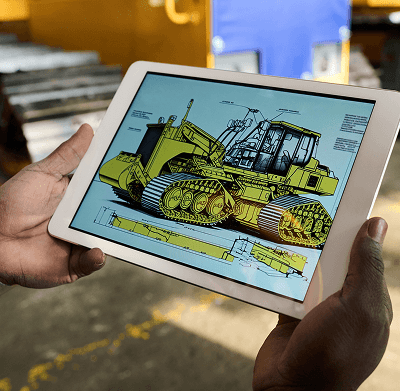
We provide comprehensive technical publication services, offering expert technical writing, illustration, data conversion, and systems integration. Our team specializes in mechanical, electrical, and hydraulic systems, and we are adept at creating and managing technical documentation to meet evolving standards like S1000D. From authoring and graphics to legacy data conversion and 3D model integration, we deliver precise, tailored solutions to support your technical information needs.

Our logisticians are experienced in the preparation of logistics management information and critical logistics deliverables such as level of repair analysis & provisioning, maintenance planning & reliability, and logistics consulting – ensuring efficient, cost-effective support for military, commercial, and government programs.
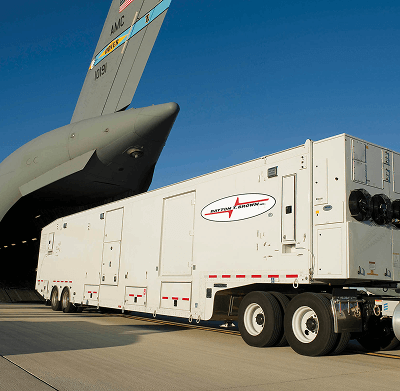
SCIFs, Shipping Containers, Material Management Support
We specialize in designing and integrating advanced products and intelligent systems such as mobile and transportable SCIFs, satellite shipping containers, and material procurement support for your critical missions.
DTB is a leader in comprehensive ballistics and ammunition testing, providing unmatched expertise and precision to meet the needs of commercial, military, and law enforcement clients. From development to compliance testing, our state-of-the-art facilities are equipped to evaluate every aspect of ammunition functionality.
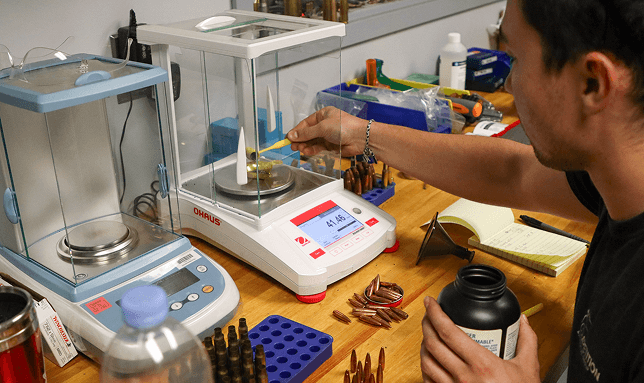
We provide thorough evaluations across a range of ammunition testing categories:
Pressure, velocity, and fragmentation analysis
FBI-standard gelatin shots, including bare gelatin, heavy clothing, steel, wallboard, plywood, and laminated automobile safety glass
Metallurgical assessments of ammunition materials
Customized evaluations for pistols, rifles, and other small arms
DTB’s advanced capabilities ensure we deliver precise, actionable data for every project:
Our advanced test equipment meets ANSI/SAAMI specification requirements, ensuring precision and compliance with the highest industry standards.
Pressure and Velocity of Rimfire Sporting Ammunition
Pressure and Velocity of Shotshell Ammunition
Pressure and Velocity of Centerfire Pistol and Revolver Ammunition
Pressure and Velocity of Centerfire Rifle Sporting Ammunition
Ammunition, Small Arms
Cartridge, Caliber .30: Armor Piercing, M2
Cartridges, Caliber .50: Armor Piercing Incendiary, M8; and Armor Piercing Incendiary Tracer, M20
Propellant for Small Arms Ammunition
DTB’s commitment to innovation, reliability, and compliance ensures the success of your ammunition testing needs. Contact us today to learn how we can support your project.
DTB offers industry-leading armor testing services to ensure protective equipment and armored vehicles meet the highest standards for performance, safety, and durability. Using advanced facilities and specialized expertise, we simulate real-world conditions to verify reliability, effectiveness, and long-term functionality of body armor, vehicle armor, and their components.
Verify armor durability and structural integrity.
Measure and evaluate transparent armor properties per ATPD 2352 standards.
Replicate temperature extremes, humidity, and shock conditions.
Comprehensive ballistic evaluations for body and vehicle armor.
Advanced tools for immediate testing feedback and adjustments.
Accommodate full vehicle testing with advanced chambers and ballistic ranges.
DTB conducts armor testing to meet and exceed established industry standards:
Ballistic Resistance of Body Armor
Ballistic-Resistant Protective Materials
Protection Levels for Logistic and Light Armored Vehicles
Bullet-Resisting Equipment
Transparent Armor Testing Standards
Environmental Engineering Considerations and Laboratory Tests
Contact DTB today to learn more about our testing services for body armor, transparent armor, and armored vehicles.
DTB offers comprehensive weapons testing services designed to ensure optimal performance, reliability, and functionality under the most challenging conditions. Our 100 m indoor shooting range and advanced testing capabilities allow for detailed evaluations of small and medium caliber weapons, meeting the rigorous demands of OEMs, law enforcement agencies, and military applications.
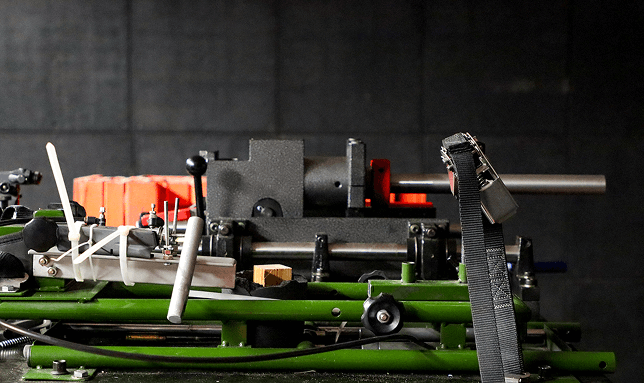
High-volume proof testing for handgun and rifle components to ensure safety and reliability.
Evaluate performance under adverse conditions, including extreme temperatures, corrosion, ruggedness, and lubricant compatibility.
Perform 100 m accuracy tests, barrel evaluations, and failure analysis to optimize weapon functionality.
Test and evaluate weapon accessories, including shot counters, laser sights, scopes, tactical lights, and recoil systems.
DTB adheres to industry-leading standards to ensure thorough and accurate evaluations:
Small Arms: Hand and Shoulder Weapons and Machineguns
Autoloading Pistols for Police Officers (1998)
Criteria for Evaluation of New Firearms Designs Under Conditions of Abusive Mishandling (1996)
Guns, Machine; Calibre .50, Browning, M2, Heavy Barrel
Contact DTB today to schedule weapons testing or to discuss your specific evaluation needs. With our cutting-edge facilities and expert staff, we’re committed to delivering the insights and improvements you need to excel.
DTB’s state-of-the-art 100m indoor shooting range is designed for precision, safety, and efficiency. Capable of testing up to .50 caliber weapons, our facility supports a wide range of testing, training, and development needs.
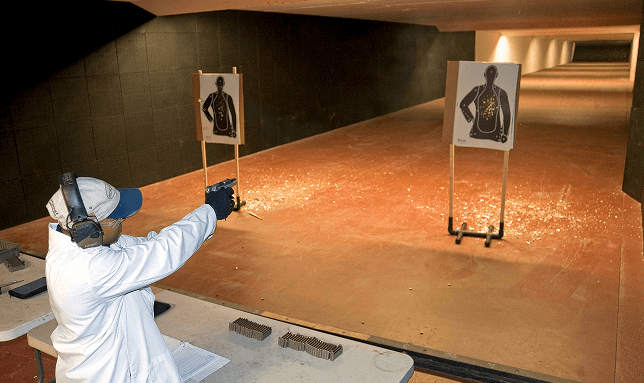
Evaluate weapons and ammunition under extreme environmental conditions for heat, cold, humidity, and other challenging factors.
Complete evaluations for armored vehicles, including live-fire testing and environmental exposure analysis.
Partner with DTB’s experts for innovative testing solutions tailored to your unique needs.
DTB’s shooting range is equipped with the latest technology to support a wide array of testing and evaluation services:
Designed for larger caliber armor resistance testing.
Ensures privacy, security, and confidentiality for sensitive projects.
Comprehensive testing for durability and reliability over time.
Verification of safety and functionality before deployment.
Efficient range operations for small arms and ammunition testing.
DTB’s shooting range services meet all federal, state, and local licensing requirements, ensuring compliance with the following standards:
Physical Security of Sensitive Conventional Arms, Ammunition, and Explosives
DoD Contractors' Safety Manual for Ammunition and Explosives
National Industrial Security Program Operating Manual
Government Property
Ballistic Resistance of Body Armor
Contact DTB today to learn more about our indoor shooting range services and how we can support your testing requirements.
DTB provides state-of-the-art facilities and support to meet the training needs of law enforcement professionals and tactical teams. Whether for routine training, product demonstrations, or tactical operations, our resources are designed to ensure a safe, controlled, and effective environment.
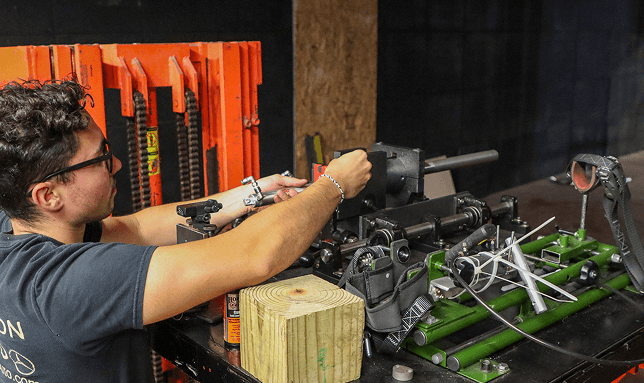
Conduct on-site demonstrations for tri-state law enforcement agencies to showcase weapons, accessories, and tactical gear.
DTB provides full support to ensure seamless preparation and execution of product demonstrations.
Capture and analyze training sessions or demonstrations for improved insights.
Training availability around the clock to meet the needs of diverse schedules.
DTB’s facilities and services comply with all federal, state, and local regulations, ensuring a secure and efficient training experience.
Contact DTB today to schedule your law enforcement or tactical training session, book our facility for product demonstrations, or discuss how we can support your specific training needs.
Dayton T. Brown, Inc. 1175 Church St. Bohemia, NY 11716
Dayton T. Brown, Inc. 23967 Prop Way Hollywood, MD 20636